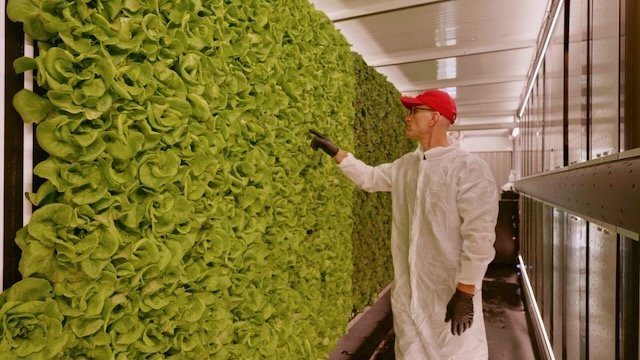Freight Farms Partners with Biosphere 2 to Pioneer the Future of Indoor Agriculture
Biosphere 2 is turning to Freight Farms to further novel research on creating a circular economy of food production, its benefits and the role of vertical farming
BOSTON, Sept. 8, 2022 — Freight Farms, the world's leading manufacturer of container farming, today announced a partnership with The University of Arizona Biosphere 2, the lauded experimental research facility and its team of free-thinking scientists, to explore new ways of growing food in the face of environmental challenges threatening the global food system. This endeavor is part of Biosphere 2's larger initiative to advance the understanding of natural and human-made ecosystems through integrated research to increase the resilience and sustainability of Earth systems and human quality of life.
The increasingly erratic climate and rapidly changing environment threaten the harmonious relationship between humans and the land used to sustain us. The resulting imbalance will only amplify in the coming decades if nothing is done to find solutions to these issues now. Freight Farms and Biosphere 2 feel a collective responsibility to explore new ways of growing food for the future in the face of these challenges.
“At Freight Farms, we believe that a decentralized system of food production is essential to improving the resilience and security of food access globally,” said Rick Vanzura, CEO of Freight Farms. “Growing hyper-local food year-round, by the community, for the community, is an important part of our collective future. This is why we make modular vertical farms that can be shipped and installed anywhere in the world, bringing the farm and the power of self-growing to communities of all kinds.” As the Freight Farms Greenery S container is being used by Biosphere 2 for research, it is also delivering fresh produce to the University of Arizona. In August, the first crop of lettuce grown in the container farm at Biosphere 2 was delivered to the University of Arizona Campus Pantry and the Impact of Southern Arizona community food bank. The crop included about 800 heads of red and green butter lettuce.
“We are excited to share our first crop to come out of the Freight Farms and Biosphere 2 collaboration. The Greenery S is the latest generation modular container farm that brings agriculture to a new dimension by growing and harvesting produce that is herbicide- and pesticide-free. This technology makes it possible to bring fresh food to an area where it might otherwise be impossible to grow and help to develop food systems for the future.”
Vertical farming's ability to control environmental factors makes it critical for the future of food development. These older, time-tested systems of growing, like hydroponics, are being re-imagined as new technologies — precision-controlled growing environments — allowing for year-round food production in hot deserts and frozen tundra alike. These systems can be powered by clean energy and need only a few gallons of water daily, making them well-suited to withstand our rapidly changing world.
Freight Farms has brought precision growing into the future with farmhand®, its IoT farm automation software. The only software of its kind, farmhand allows indoor farm operators to control temperature, lighting, and other environmental variables in their farms by connecting to in-farm sensors. Farmhand allows for both monitoring and controlling different indoor farming systems, so that data and insights from the crop planning and planting process can be used to enable production of higher quality, more flavorful, and more nutritious produce.
The transformative power of these vertical farms can best be seen through the work of existing Freight Farmers across 34 countries and more than 520 farms, which now includes the team at Biosphere 2 on their joint quest to revolutionize local access to food.
About Freight Farms
Founded in 2012, Freight Farms debuted the first vertical hydroponic farm built inside an intermodal shipping container with the mission of democratizing and decentralizing the local production of fresh, healthy food. Since then, Freight Farms has expanded its product offering and now has the largest network of connected farms in the world, with global customers ranging from small business farmers to the corporate, hospitality, retail, education, and nonprofit sectors. AgTech Breakthrough named Freight Farms the 2022 "IoT Monitoring Solution of the Year" for its farmhand® IoT automation software.
About Biosphere 2
Biosphere 2 (B2), a campus of the University of Arizona (UA), engages in world-class environmental research, education, and entrepreneurship leading to solutions for humanity's grand challenges of climate change, biodiversity loss and sustainable development, on Earth and beyond. The core research facility of the B2 campus is the world's largest indoor controlled environment for ecological and climate change research across multiple biomes. The campus also boasts a growing number of specialized research spaces, including facilities dedicated to development of co-located food and photovoltaic energy production and a human-habitat analog for the Moon and Mars that emphasizes research on life support systems and astronaut training. The B2 campus hosts a UA Center for Innovation incubator, a Visitor Center that attracts and educates nearly 100,000 visitors annually, and a 100-person conference and retreat center.

